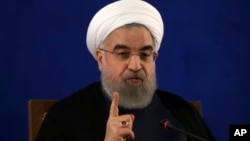Iranian President Hassan Rouhani said Wednesday his country will stand firm against the United States and respond to any new sanctions the U.S. imposes on the Islamic republic.
"We will stand up to the United States," Rouhani said and, without elaborating, said, "The great nation of Iran will have an appropriate answer."
Rouhani's remarks, made during a televised Cabinet meeting, came one day after the U.S. imposed new sanctions on 18 individual Iranians and groups it accuses of backing Tehran's ballistic missile program.
Rouhani is a political moderate who has been increasingly outspoken about the U.S., describing ties with Washington as "a curvy road."
The State Department announced its sanctions against two groups linked to Iran's elite Revolutionary Guards, saying they were involved in ballistic missile research and development.
It further said that Iranian activities in the Middle East "undermine regional stability, security and prosperity."
US Treasury sanctions
Meanwhile, the U.S. Treasury Department sanctioned five people and seven entities for their support of Iranian military purchases, as well as an "Iran-based transnational criminal organization” and three Iranians it said are associated with it.
The sanctions freeze any assets the targeted Iranians might have in the U.S. and block Americans from doing business with them.
At the United Nations in New York, Iranian Foreign Minister Mohammad Zarif told VOA that sanctions have "unfortunately become a bad habit" with the United States, and that the U.S. can expect reprisals from Iran.
"It will involve people who have participated in terrorism and extremism in our region as well as supporting expansionism," Zarif said. He added that an announcement on retaliatory sanctions on the U.S. will come "in due course."
Middle East Institute senior scholar Zubair Iqbal says the U.S. sanctions will hurt economic growth in Iran, fueling income inequality and giving the hardline conservatives in the country more reason to continue an anti-American and anti-Western attitude.
"Under these circumstances, the forces that will be unleashed will likely be not particularly beneficial for the American longer-term interests," Iqbal told VOA.
Washington announced the new sanctions just a day after it recertified Iranian compliance with the nuclear agreement Tehran signed in 2015 with the U.S. and five other world powers. The deal requires Iran to limit its ability to enrich uranium and take other steps to ensure it is not working to develop nuclear weapons, all in exchange for sanctions relief.
A senior Trump administration official said that while Iran is technically meeting the terms of the nuclear deal, it is "unquestionably in default of the spirit of the agreement," adding that the U.S. is working with its allies to more strictly enforce it going forward.
Review of deal
The Trump administration has been conducting a months-long review of the nuclear deal and other aspects of U.S. policy toward Iran. Behnam Ben Taleblu, an Iran analyst at the Foundation for Defense of Democracies, says Washington is using the new sanctions to send a message to Tehran about that review.
“The sanctions are designed to say that while this interagency [governmental] review is going on, this administration is dedicated to containing, rolling back and deterring Iran’s non-nuclear threats to the region,” Taleblu said in an interview with VOA’s Persian Service. “Those threats include ballistic missile development and transnational crime, and that is why the sanctions that we have seen from the U.S. Treasury and State Department are so important.”
Also Tuesday, the U.S. renewed its demand that Iran free three Americans held on what the U.S. calls "fabricated national security related charges." It also insisted Iran keep its promise to free former FBI agent Robert Levinson, who has been missing in Iran for more than a decade.
Margaret Besheer, Victor Beattie and Hooman Bakhtiar of VOA’s Persian Service contributed to this report.

